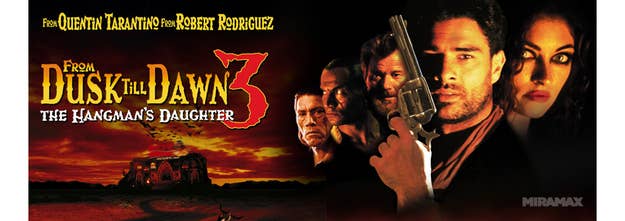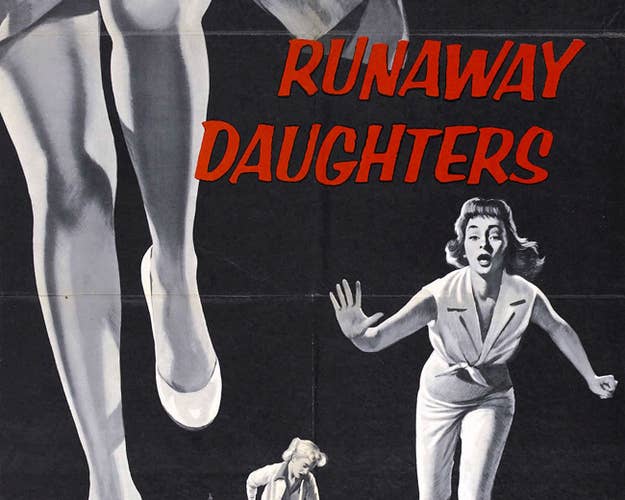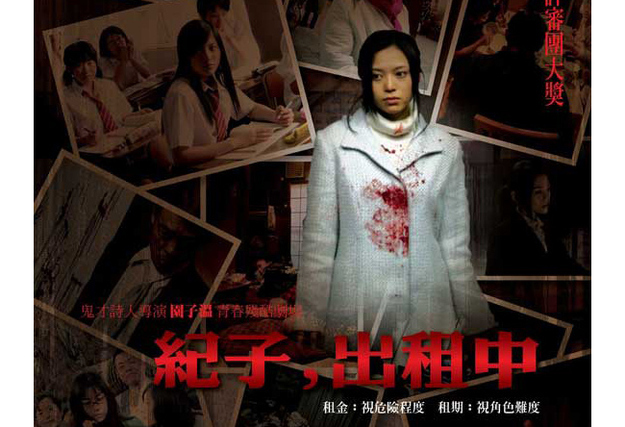
If you're in the mood for a dust-and-blood genre mashup that's a lot better than it has any right to be: From Dusk Till Dawn 3: The Hangman's Daughter (1999, P.J. Pesce)
Nobody expects much from direct-to-DVD sequels, with good reason – they generally exist to squeeze a few meager dollars out of a non-starter of a franchise. A film that features author Ambrose Bierce in Mexico fighting vampires alongside the Noxzema girl and the 7Up guy would be expected to fall in line with that trend. Yet, From Dusk Till Dawn 3: The Hangman’s Daughter has more to offer than its questionable lineage would suggest. It’s a striking example of a would-be paycheck gig that gets elevated above its station simply because most of the principals are trying to make something they’d want their names on. The delirious script, devised by Robert & Alvaro Rodriguez, is structured similarly to the other two films in this series but has at the very least the strongest tonal consistency of them. It’s also the only one of the series where the lead character complains to someone, “Your stupid friend ate my horse,” and later has to battle sentient vampire intestines.
The front-end genre being indulged this time around is the spaghetti Western, with the bulk of the plot spinning off from outlaw Johnny Madrid (Marco Leonardi), his failed execution at the hands of The Hangman (Temuera Morrison) and his kidnapping of the title character (Ara Celi). Director P.J. Pesce keeps the film moving at a quick clip while making the journey towards the expected destination ever-more foreboding (in particular, he makes effective use of scorching red filters in a cemetery scene midway through), and he gets reasonably solid performances out of his B-grade cast. He also handles the shift from stylish Western to over-the-top gore with aplomb, even finding time to drop in a bizarre but welcome sepia-toned tango interlude in the middle of the first vampire melee. And then there’s Michael Parks, veteran of the first From Dusk Till Dawn, as Bierce. A title card informs us that the famed writer has wandered down to Mexico in order to join Pancho Villa’s revolutionary army, though one wonders what use any army could possibly have for a man like Bierce. He’s sneakier and tougher than he looks, though. Amid the chaos and the hyperbolic carnage, it’s ultimately Parks’s show. He’s the whiskey-soaked two-fisted soul of the film.

If you're in the mood for an enjoyably whole-hearted homage to a faded genre: Runaway Daughters (1994, Joe Dante)
“I’ve never done anything like this!” exclaims put-upon protagonist Mary (Holly Fields) as her friends prepare to steal a car.
“Yeah, well, I’ve never gotten pregnant,” fires back brassy Angie (Julie Bowen).
With a wink and a nod, this sums up the straight-laced morality of the ‘50s teen pics being riffed on by Joe Dante’s Runaway Daughters — one moral lapse, one sexual scandal is enough to send even the sweetest girl tumbling down a slippery slope to delinquency, thievery, assault and other criminal acts.
The temptation towards sniggering irony is unavoidable with this sort of nostalgia pastiche, yet Dante (an Atom-Age romanticist if there ever was one only a year removed from his delightful Matinee) isn’t one for sniggering. He genuinely adores this mode of filmmaking, and as such has constructed it in part as a love letter to a bygone era, complete with Roger Corman cameo and sidelong nod to American International Pictures (in a brief shot of a sign that reads American International Petroleum). Rather than standing above the material, he keeps the japes agreeable while indulging his sneaky affection for these misguided youths; he lets the ineloquence of the local motorcycle tough dating Angie (played, in one of his first roles, by Paul Rudd) come off as a genuine teenaged awkwardness rather than plain stupidity. But he also allows his prankishly anarchic side free reign; this is, after all, a road picture, and the point of a road picture is to throw ever-crazier obstacles in the path of Our Heroes. It may be too self-aware to pass as the kind of melodrama it’s gently mocking, but the mockery comes from a position of sincerity rather than superiority, which makes a big difference.

If you're in the mood for a beautiful brain-twister of a teen-angst movie: Noriko's Dinner Table (2005, Sion Sono)
Sion Sono’s genre-scrambling teenage-wasteland horror film Suicide Club hinged on a question: “Are you connected to yourself?” Sono’s followup, Noriko’s Dinner Table, broadens the question into, “If you are connected to yourself, what is yourself?” The definition of that last word looms large in the mind of Noriko, the disaffected high-schooler who runs away from home to Tokyo at the film’s outset. Though the manifestations of her teen angst (confusion, anxiety, rebelliousness, defiance) are unremarkable, that doesn’t make them any less potent. Having trouble figuring out where she fits, she finds solace in a chat room where she can reinvent herself as Mitsuko – the confident, likeable person she wants to be. Once in Tokyo, she meets up with Kumiko, a fellow chat room denizen who goes by the name of Ueno Station 54 (after the coin locker where she literally keeps her invented life history). Sono pushes the notion of identity through a lot of different permutations; the operative logic Kumiko subscribes to is, if you don’t know your purpose, make one, and if you don’t like who you are, change who you are until you find a you that you feel connected to. The cutting drama, then, comes from the space between the real and the assumed and how that affects the swooning hormonal melodrama. And how does this relate to a central incident where fifty-four schoolgirls cheerfully leapt in front of a subway train? “It’s time for you to wake up to your role,” a mysterious stranger tells Noriko’s father at one point in the film, and the question of his role – everyone’s role – is the driving force of this jittery, nervous and intellectually engaging work.
The constant self-examination could in some hands be stultifying, but Sono keeps the tension high with unexpected plot developments and raw, handheld camerawork that reflects the tumult of its young characters. Tell me who you are, who you wish you were, who you think you’ll be, he seems to say. Keep pulling at that thread. See what happens when you let it unravel. (Noriko’s Dinner Table expires from Netflix Instant on June 30th.)
The Netflix streaming library is vast and daunting and mostly filled with crap. Steve Carlson is the Netflix video clerk, and every week he hand-delivers three awesome movies you've never heard of before. He's been writing about movies in one form or another on the Internet since 2002 and co-hosts the Bad Idea Podcast. Someone once called him the lonely Magellan of exploitation cinema. He thinks that's the best compliment he's ever received.
